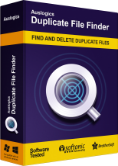Technical Support for Duplicate File Finder
Frequently asked questions:
-
What is MD5?
MD5 is an algorithm which allows to find files with identical content by comparing their checksums. MD5 checksum of a file is as unique as a fingerprint of a specific individual. That is why there is a very small possibility of getting two identical checksums of two different files.
If you haven't found the answer you are looking for, please fill out this contact form with your question and we will reply to you shortly.
-
Can Auslogics Duplicate File Finder check files on removable drives?
Yes, Auslogics Duplicate File Finder supports removable devices like USB flash drive.
If you haven't found the answer you are looking for, please fill out this contact form with your question and we will reply to you shortly.
-
Which Windows versions does Auslogics Duplicate File Finder support? Does it work with 64-bit and 32-bit processors?
Auslogics Duplicate File Finder supports the following Windows versions:
- Windows 7 (32-bit and 64-bit)
- Windows 8 (32-bit and 64-bit)
- Windows 8.1 (32-bit and 64-bit)
- Windows 10 (32-bit and 64-bit)
- Windows 11
It does not support Windows 2000, 95, 98, 98SE, ME, XP or Vista.
There are no Mac or Linux versions.
If you haven't found the answer you are looking for, please fill out this contact form with your question and we will reply to you shortly.
-
Is it really free?
Yes, Auslogics Duplicate File Finder is absolutely free and contains no spyware or adware! If you like this program, you can help us by telling other people about it.
-
Does DFF support network drives?
No. This function has been disabled for security reasons.
If you haven't found the answer you are looking for, please fill out this contact form with your question and we will reply to you shortly.
-
iTunes finds a lot of duplicate songs, but DFF doesn’t detect them. Why?
There are two most likely reasons:
- The songs are not true duplicates. iTunes detects songs as duplicates if they have the same name and the same artist name. It doesn’t consider the difference in length, different tags, etc.
- You have the “Ignore File Names” and “Ignore File Dates” options disabled. Enable these options and scan again.
If you haven't found the answer you are looking for, please fill out this contact form with your question and we will reply to you shortly.
-
Why does one need the “Ignore File Names” and “Ignore File Dates” options?
By default Duplicate File Finder has very strict search criteria: the files have to have the same name, the same creation/modification date, and they have to be identical on the binary level. The “Ignore File Names” and “Ignore File Dates” options make the search criteria less strict: the first option allows DFF to ignore file names and the second option allows DFF to ignore file creation/modification dates. If you enable both options, Duplicate File Finder will only perform checksum and byte-by-byte comparison, i.e. match files by content.
If you haven't found the answer you are looking for, please fill out this contact form with your question and we will reply to you shortly.
-
I think that I have a lot of duplicate files, but DFF isn’t detecting them. Why?
Most likely you have “Ignore File Names” and “Ignore File Dates” disabled. Enable these options and scan again.
If you haven't found the answer you are looking for, please fill out this contact form with your question and we will reply to you shortly.


![[FIXED] How to Fix Sound Not Working in Windows 10/11](/en/articles/wp-content/uploads/2024/07/FIXED-How-to-Fix-Sound-Not-Working-in-Windows-1011.png)
![[SOLVED] How to Troubleshoot No “Switch User” Option in Windows 10/11?](/en/articles/wp-content/uploads/2023/09/shutterstock_2174358855-1-scaled.jpg)









 Download
Download